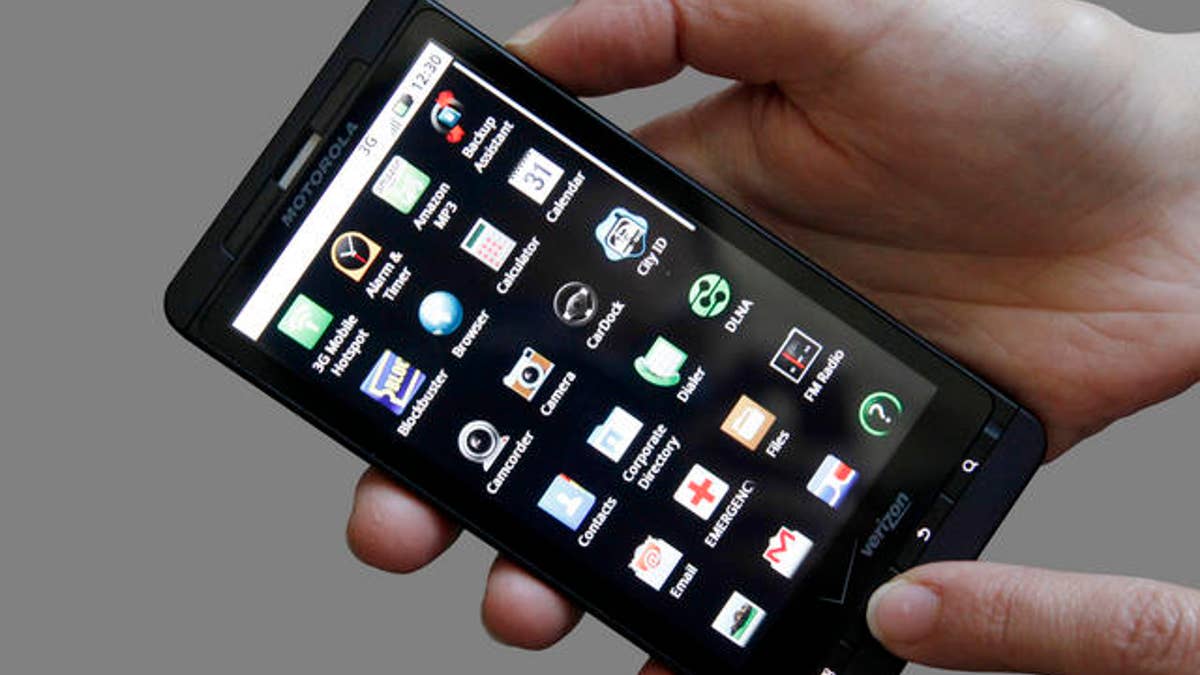
FILE - In this June 30, 2010 file photo, an Associated Press reporter holds the Droid X, the latest addition to Motorola Inc's smart phone line, during a product review in San Francisco. For decades, Motorola's products told the story of the march of electronics into the hands of consumers: car radios in the 1930s, TVs in the 1940s and cell phones in the 1980s. (AP Photo/Jeff Chiu, file) (AP)
Some federal employees are gearing up for a cyber-battle against President Trump, and they are creating a hidden messaging system to elude detection.
According to POLITICO, employees of agencies that seem on the chopping block of the new administration are setting up new email addresses and turning to encrypted messaging apps to hold group conversations with other anti-Trump staffers, and to communicate with the press.
They’re also using these cloak-and-dagger methods to work on letters that take exception to Trump policies, POLITICO reported.
Career employees at the State Department have amassed some 1,000 signatures on a memo that expresses condemnation of Trump’s executive order that imposes a travel ban on immigrants and that puts a hold on refugee admissions from seven Muslim-majority countries deemed hotbeds of terrorist activity.
Employees of other agencies, such as the Labor Department and Environmental Protection Agency, also have turned to off-the-grid messaging to urge U.S. senators to oppose Trump Cabinet nominees and warning against the president’s plans to make cuts in some agencies.
Such off-grid communication can work, and stay within legal boundaries, say experts, so long as it is done during personal time and on personal equipment.
“It could work, but it depends on whether they are using their office computers or networks,” said Jim Lewis, director of the Strategic Technologies Program at the Center for Strategic and International Studies, to Fox News. “If they are, they’ll be detected, even if they use encryption. If they are using private accounts or devices, it would require a warrant to find them and they aren’t violating any law if they stick to opinion.”
Lewis served as a Foreign Service officer with both the State and Commerce departments.
“Illegal surveillance would lead to a lawsuit against the [agency] that conducted it [and] the workers would win,” Lewis added. “Encryption is a problem in that it can hide communications between two people but can be a handicap if you want to share material widely.”
Some State Department employees see it as their civil duty to flag any policies or proposals that they believe will be detrimental to their agency’s role, POLITICO said.
“I think we all have to look within ourselves and say ‘Where is that line that I will not cross?’” one Foreign Service officer said about opposition toTrump's ban, according to POLITICO.
One of the most high-profile acts of dissent occurred when Acting Attorney General Sally Yates ordered the Department of Justice’s lawyers not to defend the ban order in court.
Trump abruptly fired her.
Recently, news surfaced about a Secret Service agent who last year said in a Facebook post that she would not sacrifice her life for Donald Trump if he became president.
Employees of the National Parks Service raised eyebrows when the agency’s Twitter account had a retweet of photos showing crowds at Trump’s and Barack Obama’s inaugurations.
The agency removed the retweet and described it as an error.
But so-called “unofficial resistance teams” at the park service, EPA and NASA have been apparently using alternative accounts to take jabs at Trump and his policies.
One tweet, cited by POLITICO, said: “Can't wait for President Trump to call us FAKE NEWS. You can take our official twitter, but you'll never take our free time!”
Many of the federal workers turning to under-the-radar means of communicating are using Signal, a smartphone app that can be used to send encrypted messages.
“It seems Trump is going after people who oppose things that he’s doing, so it makes sense that federal workers would be concerned about making their political ideas known,” said Jonathan Katz, director of the Maryland Cybersecurity Center at the University of Maryland.
“The [Signal] app is well-designed, it’s secure, it would be difficult to collect widespread information from it,” Katz said to Fox News. “But if [the government] wants to target a specific individual, it could do that.”




